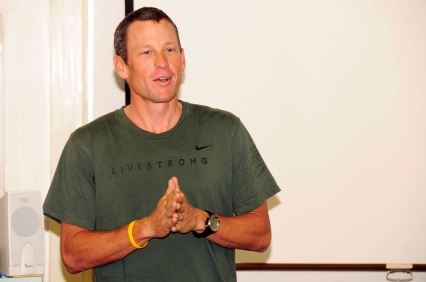Lance Armstrong: Oprah’s Pre-Airtime Comments Matter
I received this email from reader Art Aiello a couple of days ago about Oprah Winfrey’s interview with Lance Armstrong, which airs tonight and tomorrow night:
“I wonder if there isn’t something for us PR professionals to consider in that there is the interview, then the story about the interview. I find it interesting that the interview isn’t supposed to air for a couple of days, but Oprah’s talking about it in advance (likely to stoke buzz). In cases like this, the interviewee has to consider not only what he is saying during the interview and what will be said about him after it, but what the interviewer is saying about him before it.”

Art raises a great point. The period between the actual interview and the airing of that interview may influence the manner in which the audience perceives it.
In this case, Oprah interviewed Lance Armstrong on Monday, three days before it was scheduled to air. Although the parties agreed not to discuss it until after it aired, Winfrey was free to speak once Armstrong’s confession leaked. During a lengthy interview on CBS on Tuesday, Winfrey said that Armstrong “did not come clean in the manner that I expected.” That comment, which got a lot of ink, may prejudice the way people perceive the interview when it airs. (Her interview with CBS This Morning is below.)
Media trainers often teach people to aim their communications directly at their target audience, using the reporter merely as a conduit through which they can reach it. But in cases in which the interviewer may discuss and characterize the interview before it airs, that may not be the smartest approach. Interviewers who offer a strong opinion about the interview may influence the manner in which the audience ultimately views it — and their characterization will create days of headlines before the audience gets to decide for itself.
That means that the interview subject has to simultaneously persuade two audiences — the interviewer and the public. That happens much of the time anyway, but spokespeople intent on talking past the interviewer to reach the home audience may be punished in unflattering headlines before the interview ever airs.
The dynamic Art described may not have played out in a dramatic way for this interview, but he raises an important question for PR professionals planning such high-profile interviews. Here are a few solutions to help circumvent this problem:
1. Forge an agreement with the interviewer that neither side will comment on the interview until after it airs. (As we saw in this case, that agreement doesn’t always hold up.)
2. Choose an interviewer with whom you already have a personal relationship or are likely to have some sort of personal connection.
3. Opt to do a live interview instead of a taped one, eliminating the “post-interview/pre-airtime” period altogether.
4. Opt to do a taped interview that airs the same day. Also, consider an agreement that requires the interviewer to air the full, unedited interview.
What do you think? Do interviewees need to change their approach for high-profile interviews that are taped days in advance? Please leave your thoughts in the comments section below. And tune in later tonight for my review of the Armstrong/Winfrey interview.



Brad,
I believe this was a cynical attempt by both parties to reach different end goals, none of which were to get Lance to come clean and issue an apology to his supporters. Oprah wanted to boost her ratings, so she arranged for an interview to air three days later, knowing full well it would leak and she could go on CBS This Morning to talk to her BFF Gayle King, even if she didn’t actually get specific. And as has been widely reported, Lance used this opportunity to try and get “unbanned” from sport.
All in all this was a PR “yuck” moment.
Will look forward to your comments on the actual interview.
Deborah
Deborah,
I think you’re right on both counts, but I’m not upset with Oprah at all. She’s never claimed to be a journalist — she’s a talk-show host and network owner, and she’s doing exactly what she should be in that role. I only hope her questions are as unsparing as she led us to believe.
As for Lance, I don’t know that I have enough invective to properly convey the disdain I feel for him. Doping and cheating is one thing – but bullying teammates, sports officials, and anyone else who got in his way for more than a decade is unforgivable.
Thanks for reading!
Brad
I totally agree that live is better.
As for the interview itself, Lance doing a “confession” to the “high priestess” was always going to attract attention – Oprah needs the ratings as much as Lance needs a “soft” stort, safe place to weave his narrative, as opposed to say Sixty Minutes which would have been far more brutal. “Leaks” were inevitable – too big a story not to. And in today’s no deadline, 24X7 “churnalism” culture it would be naïve to think that there wouldn’t be leaks.
I for one will be watching and I haven’t watched Oprah’s new channel before! I’m a case study for what is happening!
As usual, a great post Brad. I, too, will look forward to your comments. The body language and non-verbal communication will be as telling as anything else.
Great advice, Brad. I’ve never done (or worked with a client who has done) an interview like this on a national level, so your advice will likely come in handy in the future.